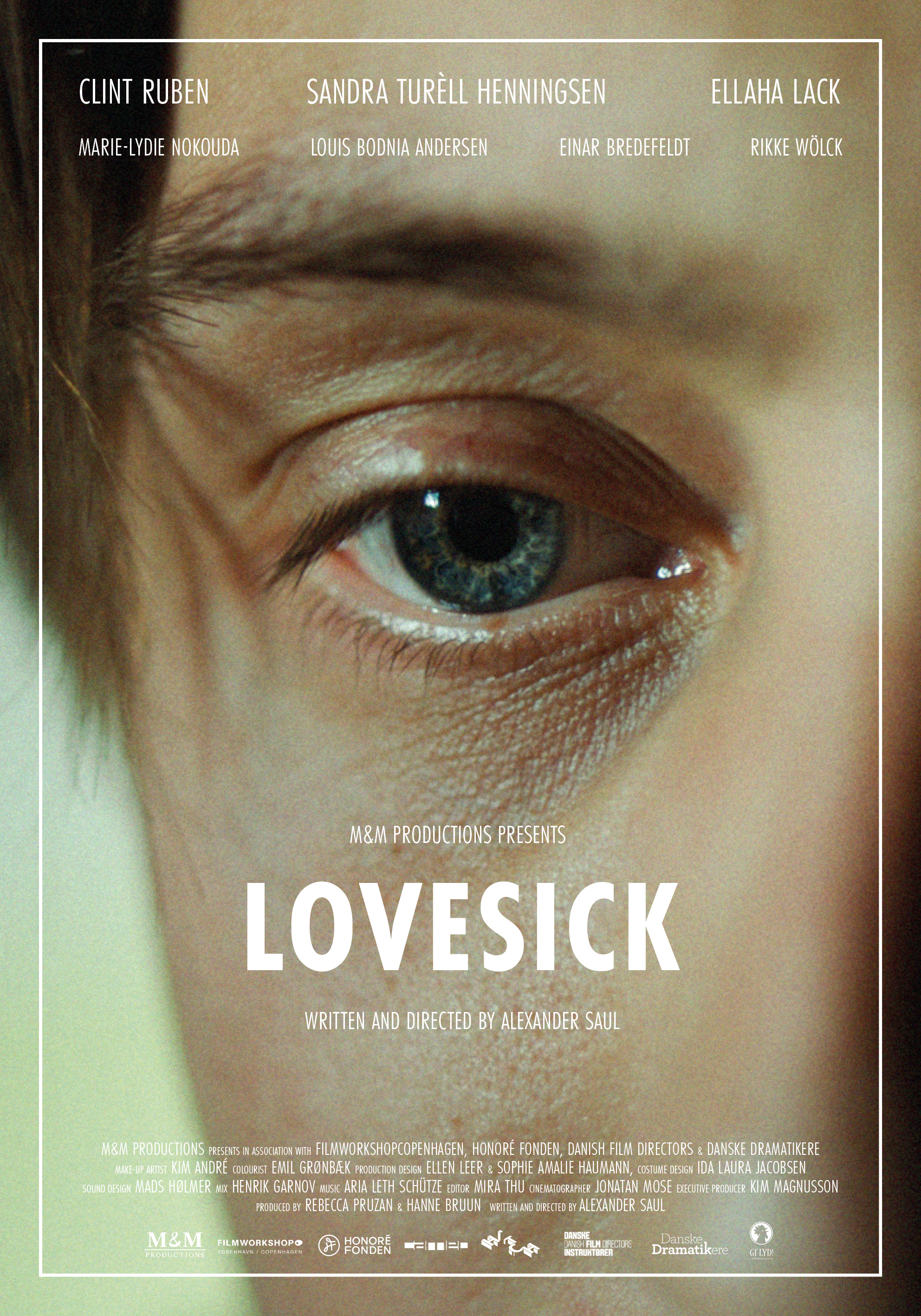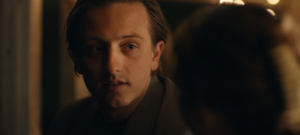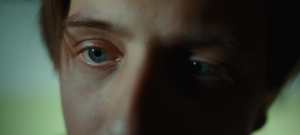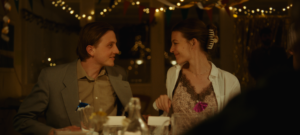
Oscar Qualifying Short Film Review “Lovesick”
WATCH THE TRAILER HERE
First, the Recap:
The architecture of yearning. There will almost always be those things in life we absolutely, expressly, desperately wish to possess for ourselves. When the feeling about it becomes so strong that the only escape is to make it happen, reality can become our worst enemy. With a struggle so real and ingrained, how much does this inward turmoil increase when the mind is already troubled to start with?
An open psychiatric facility finds one of its residents, Elias (Clint Ruben), on the calm but teetering edge of sanity. Battling a mind ravaged by hallucinations that leave him emotionally raw, it is New Year’s Eve day that finds him facing a new challenge. Managing a stormy sense of what is transpiring with his longstanding caregiver Solveig (Sandra Turéll Henningsen), time is running out for feelings he’s encountering–and the source inspiring it he desires.
Next, my Mind:
A visceral, vivid, and compellingly emotive portrait showcasing matters of the heart colliding with the strains of a fractured mind, it is an undeniably awareness-raising fire that fuels this Oscar qualifying short film from writer/director Alexander Saul, producers Rebecca Pruzan and Hanne Bruun, along with executive producer Kim Magnusson. This critic has always made it abundantly clear in the past–ANY film that chooses to tackle the highly relevant and NECESSARY issues of mental health already make it a winner to me. There is still to this day such a needlessly harsh scrutiny, even more so shame and/or disrepute “assigned” to the subject overall, much less pointed towards those afflicted by any number of totally legitimate and harrowing conditions. Point blank–THIS has GOT to cease. What we SHOULD be doing is continuing to pay heed to these issues and find ongoing, PRODUCTIVE means to HELP those combating them.
While not directly portraying Saul’s own personal experience with schizophrenia and hearing hallucinations, the narrative here does at least echo certain instances confronted in an open psychiatric facility. This alone deserves a serious amount of credit in having the willingness to be this open and, frankly, vulnerable. For the sake of this story, which highlights the inner strife of a patient who is facing the unanticipated loss of someone he more than relies on and holds a candle for, it is a deeply emotional dive into just how the mix of mental illness and strongly present, totally valid feelings can end up being both a blessing and a curse. When we find ourselves coming up against things that act as a lifeline, the mere thought of it no longer being there can form its own style of inward prison that tries to subdue us.
How much more does this get amplified when, as mentioned above, the mind is already in chaos? This is VERY present in the film’s execution, the sheer magnitude of its impact upon the primary character of Elias intelligently displayed with both underlying subtlety and then potentially explosive potency that truly leaves a mark on you as the viewer. What additionally makes the narrative create such a persuasive atmosphere is the fact that what we are seeing, SO beyond the surface truths of mental illness, is still a HUMAN BEING, someone WITH feelings, thoughts, a HEART, and, ideally, the totally logical means to pursue what life has. Yes, it’s understandable that the vastly varying degrees of mental health circumstances can affect the functionality, rationality, and perspective of the individual, THIS doesn’t replace the verity of it involving a PERSON.
It gets lost FAR too often, and again, is something that needs to STOP. The beauty of witnessing how this is all explored does credit to Saul’s filmmaking style, the authenticity, the personal nature of it all shining through. It lends that accessibility to events that transcends the foundational theme. Other tangents we are privy to here center on elements such as the depth of the mind’s imagination and power over us, the nature of jealousy and competition, the harshly accusatory voices in our heads that try to do nothing but make us see ourselves as worthless or without hope, taking chances to go for what we wish for, coping mechanisms, and having to accept that things may not go the way we want then strive to move forward. All of this gets screen time and manifests into a finale that is utterly magical in the release and it represents.
Ruben provides a wonderfully nuanced, acutely profound performance that deftly balances the innocent, heartening longing of a man seeking love with the constant conflict and self-battering raging within his mind telling him he’s nothing though his role as Elias, an existing patient staying at an open psychiatric facility and enduring a reality he doesn’t want to accept. Upon learning his favored nurse is leaving after New Year’s Eve, Elias is forced to try and make the most of not only what he’s already been experiencing within for her, but now wanting to discover the boldness to express it, in spite of all the mental turmoil telling him not to. What comes of his ultimate choice is what drives the narrative to a conclusion that will alter his world from that point forward, and Ruben navigates this will a demeanor that is heartbreaking and inspiring.
Primary supporting roles arrive first from Henningsen as Solveig, the facility nurse who’s been the main caregiver and listening ear for Elias during his stay, which has only ended up making him endeared to her to the maximum extent. I absolutely love the encompassing credibility that Henningsen brings to the character, guiding her through a time that’s instantly hard as it is, but then having to handle the feelings Elias is trying to make become real. Ellaha Lack is also a palpably noticeable force through her role as Frederikke, another resident at the facility who appears to have her own candle burning for a fellow patient. A voice of additional comfort for Elias, both by conjecture and direct interactions we witness, Frederikke’s part to play in the grander journey Elias is facing becomes paramount for what the future might hold for him.
Additional supporting turns are made by Louis Bodnia Andersen as Patrick, another patient and one who is not only guarded about those around him, but also might present a point of contention for Elias and his goals, Rikke Wölck as Ruth, the facility manager, Marie-Lydie Nokouda and Einar Bredefeldt as Tanja and Marc, two more existing patients, with voice-only appearances from Magnus Juhl Andersen, Camilla Bendix, and Rasmus Hammerich, the latter of whom stands out via being the mouthpiece for Elias’ dogged, relentless, and merciless inner voices plaguing him due to his illness. So, in total, “Lovesick” takes the entire concept of a crush and turns it on its head, expanding it into the tumultuous, immensely elevated emotional hurricane of mental illness, doing so with full intent to not just illustrate the actualities of those dealing with such inward anguish, but to also clearly show THEY ARE PEOPLE. And, when the film ends, it becomes about something FAR more affecting and persuasive–an AWAKENING.
STAR RATING (out of 5):
As always, this is all for your consideration and comment. Until next time, thank you for reading!





